It's what I primarily read as a grade schooler, and at the time, I wasn't well liked. I was a weird kid, and the stupid stories were a good way for me to become imaginitive.
Imagining the dumbassery lead me to being in my own head a lot and imagining myself in those moments, probably too much, but it branched from some stupid kids book to an entire world I still remember quite clearly, and affected what I drew.
I started paying closer attention to the bright colors of the books, the vibrant purple ones from the fourth grade series always stood out for some reason, so I started thinking of real things in that color since I basically saw it every day.
Real flowers turbed to fake flowers, which turned into fake animals, then fake monsters and worlds. You could say it was the defining moment I started being creative. I didn't put it into action until a brain injury, though.
Most of my imagination thereafter came from cartoons and videogames, but I started getting super into true crime stuff in... oh, middle school? That and the Alex Rider swries, as well as another book I'm blanking on that focused around kids with wings and superpowers that were constantly hunted by the government.
The spy stuff got me super interested in augmenting unusual things into something else, and the super power thing started making me imagine anatomy stuff a lot more.
How did the powers work? Well it explains it in this chapter. What muscles connected to the wings, oh! Surprise, it's this.
Now, it was extremely basic and not realistic, but realistic enough for me to want to expand on it.
After brain damage, I couldn't verbalize feelings very well, or thoughts. I didn't think in words either, just pictures. Even now, if ai get too overwhelmed, I'll think in extremely simple words like "mad/angry" "fear/scared" "cry" etc etc.
Now this next part is not going to make a lick of sense to any of you, but it does to me in the "in my brain damaged mind, it made total sense" kinda way. I went from these books to being extremely interested in psychology. The best way I think I could sort of explain it was spy> spies are clever> clever means smart> how does a smart person think> how do other people think
And the angels were had strong feelings>had strong opinions>strong opinions means strong thoughts (like a firm belief but again, simplified language for brain damage of this point in time) strong thoughts that clashed meant different views.
This turned into trying to draw "different thoughts" into "different styles", like different styles represented certain aspects of how a person
was. A more.... black and white view that made sense to me at the time, but made me start to see different types of grey. Not a lot, but to notice.
i focused on therapy more, was more receptive to understanding actual empathy (fun fact, one of the first things you lose in a brain injury and last to get back, if at all)
I might literally never have even tried if it didn't fascinate me.
Que time, I'm in college, and taking psych courses. The human brain fascinates me and I really, REALLY wanted to understand how other people thought, how animals thought, what it would be like if plants could think, all this bullshit so I could draw weird shit and make a weirdly in depth world that basically became my personality. Not in the chris chan way, but the "fuck all of you, I think my world is kinda neat" instead of constantly dreading what others were thinking of me.
This is probably confusing because if I didn't understand empathy, why the fuck did I care what others thought?
It was hammered into me so hard as a kid to care, and to be socially appropriate, I was basically afraid to have a personality because I basically couldn't be socially appropriate about my interests yet. I didn't even totally get why I had to care, but it getting repeated so fucking much did do damage. It was why I got bullied, on top of bringing up stuff out of nowhere, because I had no interests I was willing to talk about and was too afraid to be open and it made me not focus on what I needed to, which was learning what other people liked. And because I would make completely random non sequiturs, people had no fucking idea what I was trying to say, so it just further isolated me.
What they liked wasn't as important as thought.
That wasn't intentional on my mom or therapist, it was to try and help me become a functional person. The problem is, they forgot to transition from one to the other, and expected me to pick it up while I learned about what others thought. That I'd learn to talk about what I liked through that better understanding of how people would view it.
It sorta worked and sorta didn't. I was very fucking good at listening, and my newfound interests from those stupid books did make me interested eventually in how others thought, but there was still a missing link.
Here is the most retarded part of all this.
I went back, read Junnie B jones again for funsies during a break. Didn't like it as much as I remembered, but something FINALLY fucking clicked. Again, this is more brain damage but I'll break it down how I can.
>I don't HAVE to care, most people don't.
>I can have interests and word vomit them as much as I want like the character does
>my drawings are people
The first part is easy to explain, Junnie didn't care about others, was abbrasive, and still had friends. That connected to the second thing.
The third thing is- the different styles I was doodling were visual representations of how I understood HOW others thought. They were like individual views, i.e. people, as well as my feelings. (I also struggled figuring those apart. It was a severe tbi)
Here's some examples from over the years-
They won't make a ton of sense based on how they look but that's okay.
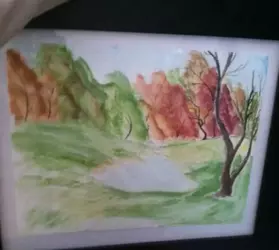
^anxiety. The world blends together and I can't make sense of it, I can't guess the person as well (this is when ai was figuring out people still) and becomes something that is obvious to others, but a blob to me.
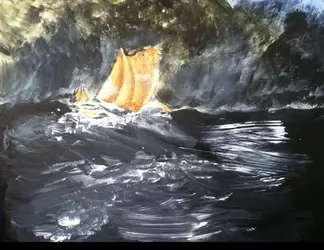
^calm
The subject matter, ironically, didn't matter to me at all. Dark, monochromatic things were calming to me, they made sense, I understood them. This is probably where my first dips into actual, true understanding came from. While I was happy painting this, it ironically was in a point in my life that I surrounded myself with heavily depressed people. They made sense, I understood, I knew how to help.
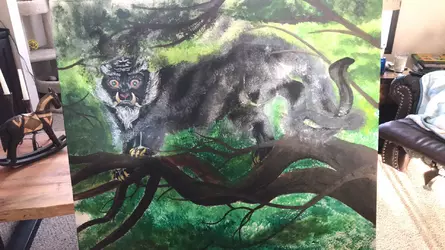
Freedom- I'm embracing my weird hobby, becoming more open, and actively trying to learn. I want to know, I actually deeply care, and want to help. I want to make a difference, and I don't want anyone to feel as isolated as I did. I still have a mask of fitting in, hence *some* realism, I hid my brain damage as much as I could, and was deeply ashamed of it. People wouldn't view me the same, I had to somewhat pretend still.
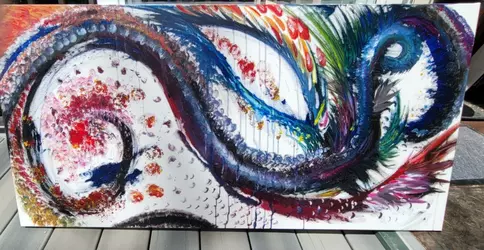
Frustration- ironically I'm most upset when painting with bright colors, especially white. So the more white something has, and the less sense it makes visually, usually the more angry I am over something. This one doesn't have a relation to understanding people in any way (technically none of them do, they're just showing a visual guide on how I see the world) let's just say I had a bad betrayal, shut myself out for a bit.
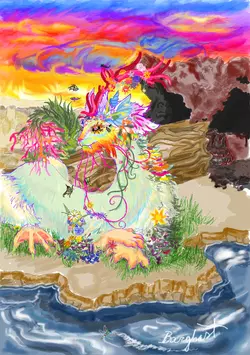
Acceptance- "fuck all y'all, I like my vomit inducing reality of Sara Frank bullshit"
I no longer hide anything. Should I? Probably, it's what a smart person would do.
I, however, am an idiot, and being a sad idiot is shit, I like my happy colors and retarded world views, some people like to listen to it which makes me happy, and sometimes those people even add to it to make it more interesting! I'm no longer afraid of people, afraid to be disliked, or just an anxious wreck that wants to go home and sleep for 12 hours after a 30 minute interaction. Now I'll talk your ear off for a couple hours and happily go on my merry way if I haven't annoyed you enough to just wander off on your own. (Pls note, I always open with "I don't shut up, just tell me if you're bored or want to talk about something else, I'm a surprisingly good listener, I just also like to talk". )
 ), it did give me big thunks about how much my own life and current events paralleled Jurgis' and the events of a hundred years ago. More importantly, when read with the knowledge of what came after its publication, it gave me even bigger thunks about how a silly little book and the masses of uneducated, malnourished, and broken people it described could stir things up enough to cause real change. Those thunks and the nagging feeling that if those people could do it no one else had an excuse not to have never left me.
), it did give me big thunks about how much my own life and current events paralleled Jurgis' and the events of a hundred years ago. More importantly, when read with the knowledge of what came after its publication, it gave me even bigger thunks about how a silly little book and the masses of uneducated, malnourished, and broken people it described could stir things up enough to cause real change. Those thunks and the nagging feeling that if those people could do it no one else had an excuse not to have never left me.







